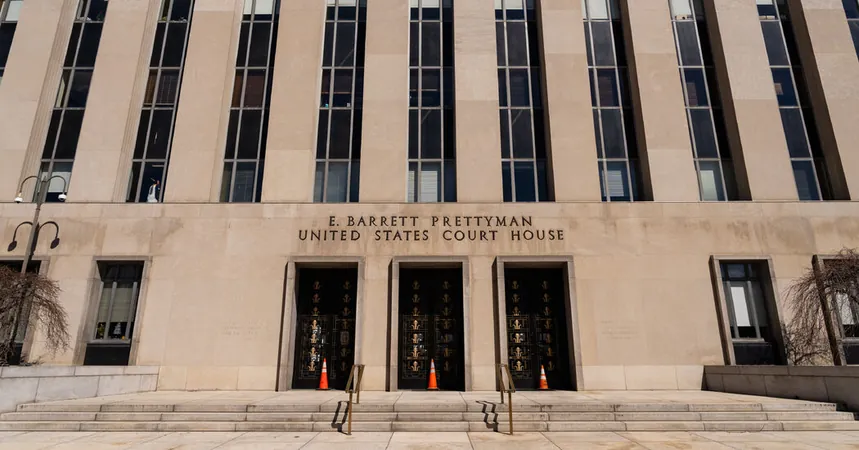
Meta Faces Major Antitrust Showdown: Could Its Social Media Empire Be Dismantled?
2025-04-14
Author: Ying
The Beginning of a Pivotal Antitrust Trial
The Federal Trade Commission (FTC) has kicked off an explosive antitrust trial against Meta, accusing the tech giant of establishing a monopoly that stifled competition. With the courtroom packed, the FTC's arguments spotlight Meta's controversial acquisitions of Instagram and WhatsApp—purchases made when these platforms were mere fledglings aimed at reshaping the social media landscape.
A 'Buy-or-Bury' Strategy Unveiled
Opening the trial, FTC lead litigator Daniel Matheson accused Meta of implementing a "buy-or-bury" strategy, claiming that these acquisitions consolidated the company's dominance, leaving consumers with fewer choices in social networking. "For more than 100 years, American public policy has insisted that firms must compete to thrive. The reason we are here is that Meta broke the deal," Matheson stated emphatically.
The Stakes Are Higher Than Ever
This landmark case, Federal Trade Commission v. Meta Platforms, presents a serious threat to Mark Zuckerberg's empire. If successful, the FTC could force Meta to divest Instagram and WhatsApp, fundamentally altering the landscape of Silicon Valley and putting an end to the trend of major tech firms swallowing up their fledgling competitors.
Can the FTC Overcome Legal Hurdles?
However, experts warn that the FTC faces a tough challenge. The agency must convincingly demonstrate that Meta wouldn’t have achieved its meteoric success without those strategic acquisitions—a tall order given the rarity of undoing previously approved mergers. Gene Kimmelman, a former DOJ official, highlighted this complexity, noting how difficult it is for antitrust laws to address acquisitions of small potential competitors.
A Battle Against Tech Titans
This trial is part of a broader bipartisan effort to rein in the immense power wielded by a handful of tech behemoths. Despite various outreach attempts from tech executives to curry favor with President Trump, his appointed officials have remained steadfast in their pursuit against monopolistic practices.
A Ripple Effect for Millions of Users
For Meta's 3.5 billion users, who regularly engage with Facebook, Instagram, and WhatsApp, the trial’s outcome could have profound implications. Both Instagram and WhatsApp have seen significant growth recently, even as the flagship Facebook app stagnates.
Meet the Key Players in the Courtroom
Among those present in the courtroom was FTC Chairman Andrew Ferguson, alongside Meta's chief legal officer, Jennifer Newstead, and global affairs chief, Joel Kaplan. The case is presided over by Judge James Boasberg, known for previously rejecting controversial decisions by the Trump administration. Despite having never been a user of Meta's platforms, he's noted their prevalence in high-profile legal cases.
The Trial Unfolds Over Eight Weeks
Expected to last around eight weeks, this trial will witness dueling narratives regarding Meta's remarkable growth over the last two decades. Central to the FTC's argument is Section 2 of the Sherman Antitrust Act, which prohibits monopolistic practices.
Scrutiny of Strategic Acquisitions
The FTC has accused Meta of overpaying for acquisitions like Instagram, bought for $1 billion in 2012, and WhatsApp, purchased for a staggering $19 billion in 2014. The agency intends to underline evidence—including emails between Meta executives—that illustrates the company's strategy of acquiring potential threats rather than allowing fair competition.
 Brasil (PT)
Brasil (PT)
 Canada (EN)
Canada (EN)
 Chile (ES)
Chile (ES)
 Česko (CS)
Česko (CS)
 대한민국 (KO)
대한민국 (KO)
 España (ES)
España (ES)
 France (FR)
France (FR)
 Hong Kong (EN)
Hong Kong (EN)
 Italia (IT)
Italia (IT)
 日本 (JA)
日本 (JA)
 Magyarország (HU)
Magyarország (HU)
 Norge (NO)
Norge (NO)
 Polska (PL)
Polska (PL)
 Schweiz (DE)
Schweiz (DE)
 Singapore (EN)
Singapore (EN)
 Sverige (SV)
Sverige (SV)
 Suomi (FI)
Suomi (FI)
 Türkiye (TR)
Türkiye (TR)
 الإمارات العربية المتحدة (AR)
الإمارات العربية المتحدة (AR)